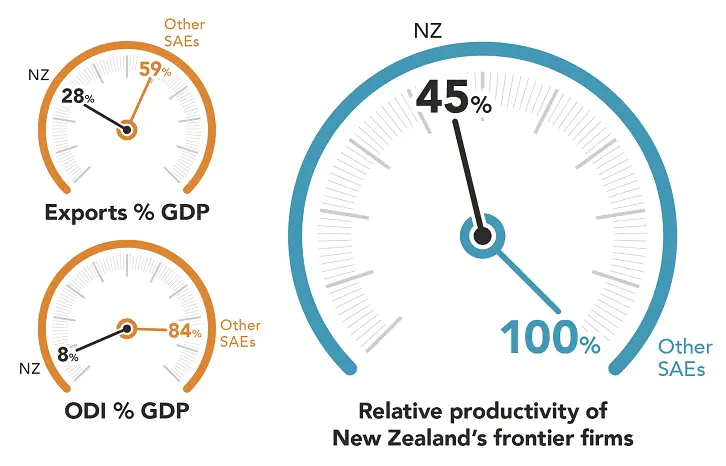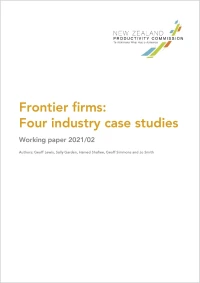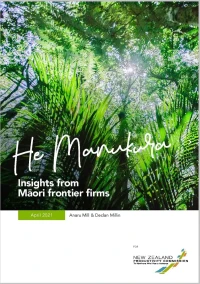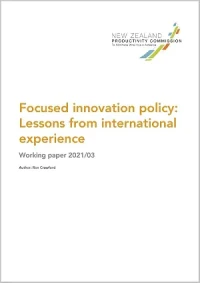 The productivity of New Zealand’s frontier firms lags on average up to 45% behind that of high-performing small advanced economies (SAEs). These countries provide a good benchmark for New Zealand, with their small domestic markets.
The productivity of New Zealand’s frontier firms lags on average up to 45% behind that of high-performing small advanced economies (SAEs). These countries provide a good benchmark for New Zealand, with their small domestic markets.
Frontier firms can increase national productivity and wellbeing by lifting their own productivity towards the global frontier, by scaling up and putting national resources to better use, and, indirectly, by diffusing innovation and best practice through the domestic economy.
New Zealand’s small domestic market and distant location makes it difficult and risky for firms to get the scale required to be world class in their industry.
Māori firms outperform other New Zealand firms on some dimensions associated with higher productivity and have unique features that support innovation. They offer valuable lessons for other New Zealand businesses.
Exporting specialised, distinctive products at scale is the best way to build world-leading firms. Scale, through large “anchor firms” and/or through collaboration among smaller firms, is needed to earn returns on investment in innovation and exporting.
Innovation is key. The Commission recommends learning from international experience and overhauling New Zealand’s innovation ecosystems to enable firms to innovate and export at scale.
Government investment should be focused on areas of existing or emerging economic strength and competitive advantage. A small country can excel in only a limited number of areas that can get to critical mass and support sustained world-class competitive performance. Rigorous monitoring, evaluation and review of strategies and of particular initiatives is essential for success.
The Commission’s final report presented 71 findings and 30 recommendations. Find out more:
 The Commission conducted case studies to examine specific issues facing four significant industries in New Zealand’s economy: Dairy, Health technology, Horticulture and Software products and services.
The Commission conducted case studies to examine specific issues facing four significant industries in New Zealand’s economy: Dairy, Health technology, Horticulture and Software products and services.

 The productivity of New Zealand’s frontier firms lags on average up to 45% behind that of high-performing small advanced economies (SAEs). These countries provide a good benchmark for New Zealand, with their small domestic markets.
The productivity of New Zealand’s frontier firms lags on average up to 45% behind that of high-performing small advanced economies (SAEs). These countries provide a good benchmark for New Zealand, with their small domestic markets.

